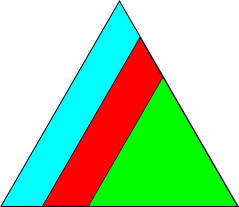inverse_pole_density_function#
- Miller.inverse_pole_density_function(resolution: float = 0.25, sigma: float = 5, log: bool = False, colorbar: bool = True, symmetry: 'Symmetry' | None = None, weights: np.ndarray | None = None, figure: Figure | None = None, hemisphere: str | None = None, show_hemisphere_label: bool | None = None, grid: bool | None = None, grid_resolution: Tuple[float, float] | None = None, figure_kwargs: Dict | None = None, text_kwargs: Dict | None = None, return_figure: bool = False, **kwargs: Any) Figure | None[source]#
Plot the Inverse Pole Density Function (IPDF) within the fundamental sector of a given point group symmetry in the stereographic projection.
The IPDF is calculated in terms of Multiples of Random Distribution (MRD), ie. multiples of the expected density if the pole distribution was completely random, see [Rohrer et al., 2004].
- Parameters:
- resolution
The angular resolution of the sampling grid in degrees. Default value is 0.25.
- sigma
The angular resolution of the applied broadening in degrees. Default value is 5.
- log
If
Truethe log(PDF) is calculated. Default isTrue.- colorbar
If
Truea colorbar is shown alongside the IPDF plot. Default isTrue.- symmetry
The point group symmetry. Default is
None, in which caseC1is used.- weights
The weights for the individual vectors. Default is
None, in which case each vector is 1.- figure
Which figure to plot onto. Default is
None, which creates a new figure.- hemisphere
Which hemisphere(s) to plot the vectors in, defaults to
None, which means"upper"if a new figure is created, otherwise adds to the current figure’s hemispheres. Options are"upper"and"lower".- show_hemisphere_label
Whether to show hemisphere labels
"upper"or"lower". Default isTrueifhemisphereis"both", otherwiseFalse.- grid
Whether to show the azimuth and polar grid. Default is whatever
axes.gridis set to inmatplotlib.rcParams.- grid_resolution
Azimuth and polar grid resolution in degrees, as a tuple. Default is whatever is default in
stereographic_grid.- figure_kwargs
Dictionary of keyword arguments passed to
matplotlib.pyplot.subplots().- text_kwargs
Dictionary of keyword arguments passed to
text(), which passes these on tomatplotlib.axes.Axes.text().- return_figure
Whether to return the figure (default is
False).- **kwargs
Keyword arguments passed to
matplotlib.axes.Axes.pcolormesh().
- Returns:
figThe created figure, returned if
return_figure=True.
